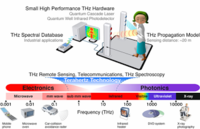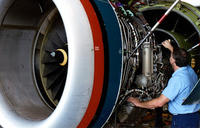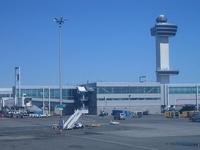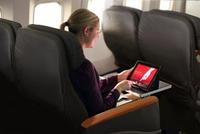-
Saudi man arrested at Detroit airport with two pressure cookers in luggage

Hussain Al Khawahir, a Saudi citizen, was arrested Saturday at Detroit Metropolitan Airport after CBP agents found two pressure cookers in his luggage, and a page missing from his Saudi passport. He said he brought them for his nephew, a university student, because his nephew liked to cook lamb in a pressure cooker and U.S. pressure cookers were just not good enough.
-
-
FAA may allow use of electronic devices on flights
The Federal Aviation Administration may announce by the end of the year that it would relax the rules for Kindles, iPads, and other e-readers. Lawmakers say that since the FAA allows iPads as flight manuals in the cockpit, and flight attendants use the devices for information on flight procedures, it makes no sense not to allow passengers to use the devices.
-
-
Terahertz technology helps to see more with less

Terahertz technology is an emerging field which promises to improve a host of useful applications, ranging from passenger scanning at airports to huge digital data transfers. Terahertz radiation sits between the frequency bands of microwaves and infrared radiation, and it can easily penetrate many materials, including biological tissue. The energy carried by terahertz radiation is low enough to pose no risk to the subject or object under investigation.
-
-
FAA oversight of jetliner repair stations is ineffective

The FAA oversees 4,800 jetliner repair stations worldwide – in countries such as China, New Zealand, Peru, and Singapore – where American commercial airplanes are being repaired. The Federal Aviation Administration’s own watchdog organization reported that the oversight of U.S. jetliner repair stations is ineffective and does not focus on stations which are most likely to present security risks.
-
-
Typo delays signing FAA budget bill into law
Typically, Congress, the country’s deliberative body, tends to take its time when it comes to legislation. This tendency was not in evidence when it came to rescheduling sequester-mandated cuts to the Federal Aviation Administration (FAA) budget in order to allow air traffic controllers to work their full schedule without being furloughed. The president was supposed to sign the bill Friday – but in its rush to pass the measure, the version which was delivered to the White House contained a typo (an “s” was missing). The president will sign the bill today.
-
-
White House to take a second look at FAA furloughs

The White House hinted Wednesday that it could accept legislation which would end Federal Aviation Administration (FAA) furloughs. Passengers have been in arms over lengthening flight delays and a growing number of flight cancellations, while GOP lawmakers accused the FAA of implementing the sequester-mandated budget cut in such a way so as to cause maximum inconvenience to passengers.
-
-
TSA reverses course on knives-on-planes policy
The Transportation Security Administration (TSA) has abandoned, for now, its proposal to allow travelers to carry small knives on airplanes owing to significant opposition from lawmakers, air marshals, law enforcement officials, and flight attendants.
-
-
FAA furloughs begin with impact on flights slight so far
Sunday was the first day of FAA furloughs, but commercial airline flights ran smoothly throughout the country. There were delays in New York area airports, but nothing that was considered significant. There were also delays in Florida, but they were caused by thunderstorms.
-
-
FAA certifies Boeing 787 can fly again after fixes to over-heating battery

The Federal Aviation Administration (FAA) has approved Boeing’s proposed improvements to the lithium-ion battery systems on its 787 passenger jets. The jets have been grounded since January and are now ready to return to the skies.
-
-
Airlines ask court to stop FAA furloughs
The FAA’s annual budget is $16 billion. As part of the sequester, the agency must reduce its budget by $637 million between now and the end of September. The agency says that the only way it can achieve these saving is by imposing a 2-week furlough on its 47,000 employees – including 15,000 air traffic controllers. A coalition of U.S. airlines has petitioned a federal court to stop the furloughs, which began yesterday, saying they would leas to the cancellation of 6,700 flights a day.
-
-
Lawmakers want FAA to allow use of electronic gadgets during flights

Lawmakers have questioned whether personal electronic devices interfere with the electrical equipment of an airliner’s cockpit, and they want the Federal Aviation Administration (FAA) to allow more such gadgets on planes.
-
-
FAA to inspect Boeing’s 737 planes for faulty parts
Federal aviation regulators will order special inspections more than 1,000 Boeing 737 jets, and possibly replace improperly manufactured parts which could cause pilots to lose control of the planes.
-
-
Texas legislators want TSA out to allow for anti-groping policy
Texas lawmakers are considering proposals to opt out of federal protection at all airports in the state. One of the proposals calls for charging airport security officials who aggressively check passengers.
-
-
Lawmakers question TSA new uniform purchase
Republican lawmakers want to know why the Transportation Security Administration (TSA) has signed a contract worth $50 million for new uniforms for the agency’s employees, at the same time that officials are complaining that budget cuts are causing staff shortages, flight delays, and longer lines at security checkpoints.
-
-
Lute to leave DHS after shepherding cybersecurity executive order effort
Jane Holl Lute, the deputy secretary of DHS, will leave the department to pursue her interest in the international Internet business. Lute was involved in formulating DHS position on cybersecurity, especially with the shift in President Barack Obama’s executive order on cybersecurity from two months ago, in which the role of private industry and DHS in bolstering Internet security was emphasized, and the role of the National Security Agency (NSA) diminished.
-
More headlines
The long view
New Technology is Keeping the Skies Safe
DHS S&T Baggage, Cargo, and People Screening (BCP) Program develops state-of-the-art screening solutions to help secure airspace, communities, and borders
